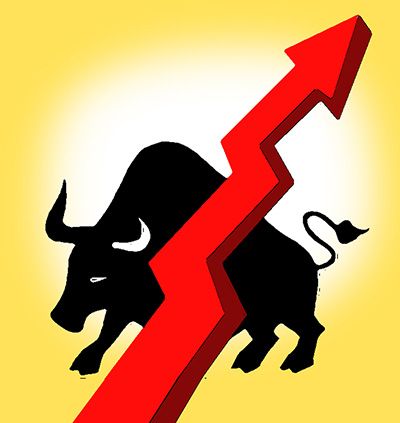'Despite uncertainties around demonetisation and the GST, we expect Indian equities to deliver positive returns.'
Illustration: Dominic Xavier/Rediff.com

Sanjay Mookim, India equity strategist, Bank of America Merrill Lynch, remains positive on India and expects Sensex earnings to grow by 12% to 14% in FY18-19.
Pay attention to numbers and don't go by anecdotal points, he cautions in this interview with Hamsini Karthik.
A couple of months after demonetisation, companies seem more positive now...
Speaking to company managements may not be very fruitful.
Investors should focus on trends in retail sales in their conversations with the companies.
Demonetisation is unprecedented and has no global parallels.
Our channel checks indicate that at the bottom of the demonetisation trough, sales were down 60% to 70% for several businesses.
Anecdotes can be misleading more than they usually are. Investors need to be far more data-focused now.
Demonetisation is not an event we can get ahead of. I suspect the numbers will not look as bad as anecdotal references suggest.
How long would the period of waiting be?
We estimate that much of the cash should be replaced by February.
The risk is in extrapolating the effects of demonetisation based on the status quo as the pain could be relieved by government policy action.
Uncertainty in recovery for discretionary sectors like auto and paints is likely higher.
But car sales have been reasonably good so far...
Yes, the numbers were better than expected, but the margins driven by discounts would be the key to profitability this quarter.
My fear is that consumer behaviour on discretionary consumption will take longer to heal as the government policy is unlikely to be focused on reviving urban discretionary demand.
We advise investors to be overweight on banks, consumer staples and cement, which is where we expect earnings to improve.
From the March quarter, banks should report improved profits supported by the low base of last year.
We don't advise seeking inexpensive value stocks now, but prefer to look for sectors where earnings are likely to recover or grow.
What about IT and health care, which are being viewed as defensives now?
We are underweight on IT.
While valuations are supportive, event risks in the sector are currently high.
We would prefer to wait for clarity on policies of the new US administration, even if it means that we review our position on the IT sector when the share prices are higher than they are now.
Top down, we prefer the pharma space over IT, although the pharmaceutical sector in India is more about bottom-up stock picking.
We believe utilities may do well in the current environment not because of their defensive qualities, but due to reduction in interest rates.
So with fewer pockets showing growth now, do you see a further valuation correction for the market as a whole?
Market valuations have been de-linked from growth prospects in India for the past five years.
Price-earning multiples for India have moved in tandem with emerging markets (EMs).
Much of the recent recovery in the markets have to do with the increase in EM stock prices and are perhaps only partly due to a review of the assessment of demonetisation.
The uncertainty due to demonetisation may not drive Indian equity valuations lower.
Despite uncertainties around demonetisation and the GST, we expect Indian equities to deliver positive returns.
Our Sensex target for the end of December is 29,000.
There is also a view that developed markets are becoming more attractive now than earlier...
Yes, higher fixed-income returns in US dollars reduce investor attraction for emerging markets.
However, increasing rates may shift some investment from bonds to equities.
Most EMs have reduced external deficits since the taper tantrum and may be able to better withstand global shocks.
We believe EMs are in a much better shape than they were in three years ago and should continue to deliver decent growth for investors.
Check out more FASCINATING features in the RELATED LINKS below.











